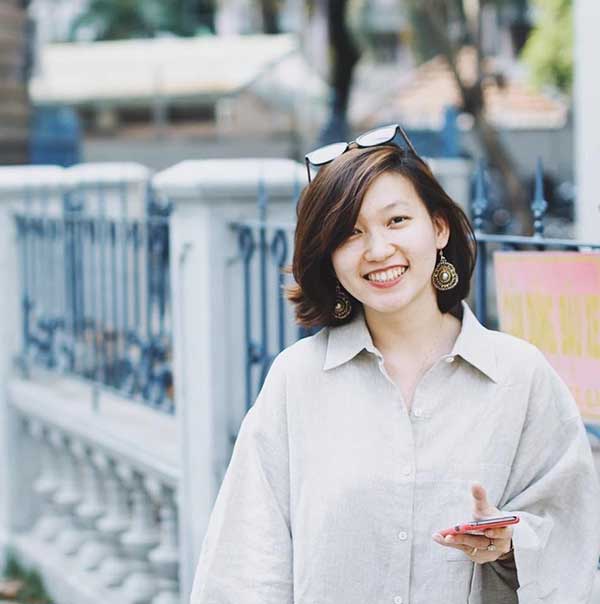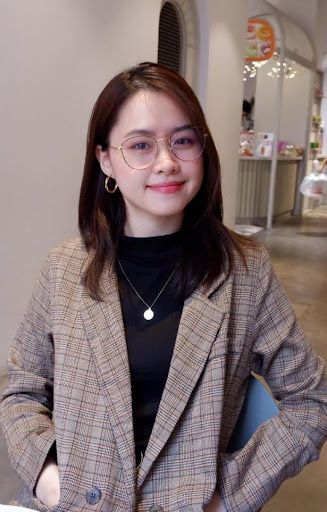In conjunction with this year’s WARC Awards for Asian Strategy, this series aims to showcase perspectives from young strategists across Asia, highlighting their take on strategy as a marketing discipline and career path. This time, we speak to Vietnam’s rising thinkers.
Vietnam, like most of Southeast Asia, continues to battle the rise in COVID-19 cases via lockdown measures. But while the market’s economic outlook remains subdued, that hasn’t dimmed the view that the future is full possibilities for these young minds.
One thing’s for certain – no matter what the landscape may be at the other end of the current COVID tunnel, these bright practitioners are focused on looking forward and seizing every opportunity to learn, grow and make a difference. They’ll no doubt be making their presence felt in the coming years.
Tien Khong

Title: Director, Creative & Strategy
Company: Dentsu Redder
Age: 29
How did you find your way into strategy work?
It was not a direct pursuit.
Eight years ago, Dentsu-Redder hosted a Young Marketers student contest, through which I got into the agency as a Creative Planning intern. I believe it’s the perfect position for any student who does not know what to do with their life, which career path to pursue or to start with because it is the position that’s exposed to everything: from strategic planning, to ideation, copywriting, art approach, production supervision and everything miscellaneous in delivering a piece of work, derived from the agency’s philosophy to empower ownership.
Post university graduation, I tested the water on the client side as a Leaders’ League trainee and then as a brand manager for a couple of years. It took that much time – six years jumping around the disciplines – to finally come back here in a Creative Planning hybrid position.
I believe the way this journey went shaped the thinking process that I apply in my day-to-day work: to examine multiple aspects of the picture, to then come back to the beginning, starting the argument on a clean white sheet of paper.
As a strategist, how do you spend your time at work?
Most of the time I spend streamlining the amount of information I receive, abundantly per brief, taking the unnecessary off the table, reducing it all down to the actual brief and answer. A lot of people, my friends included, visualise the job of the strategist as a Googler, gathering as many facts and figures as possible. Yet surprisingly the one with the numbers are the clients - with the amount of data they gather to provide the strategists with Focus Group Discussion transcripts, decades of category establishment, their distribution etc. The value I add is, perhaps, the awareness they are just as lost in the sea of information as I am and the attempt to simplify and navigate, instead of adding more to the load.
How do you personally define the discipline of marketing strategy?
At Dentsu Redder, we refer to the strategist as the sewing machine or a tailor. Meticulously finding the logic of connection between creative, business, media patchworks and aligning them towards making one consistent statement.
What’s on your wish list in terms of strategic thinking/work?
I would say time. Because good things take time. Of course, the fascination of the agency side comes from exposure to multiple categories, brands, challenges, refreshed every day. But it also comes at a cost that time spent per job is reduced day by day – easily putting young strategists such as myself in the zone of automation. Applying the same, expected structure on multiple exercises instead of making our brain work.
The fascinating territory that I’ve been exposed to at the agency is the power of local nuances in shaping behaviour, mindset, movements and therefore businesses. At such a pridefully locally-rooted agency as Dentsu Redder, we are inspired every day to contribute our strengths in growing local craftsmanship, agricultural products and philosophies and would love to receive and address more of such challenges from a strategic perspective.
Where do you see yourself working in 5-10 years? Would you stay in agencies or move to brands/consultancies/tech startups?
Maybe, and there is a high chance that I will still be here, as a Creative Strategy hybrid on the agency side. I have spent a few years jumping around the disciplines of the marketing/advertising world and found the most comfortable spot behind the curtain, streamlining my thoughts.
The way I see my career developing in the next 5-10 years is rather on the width, accessing more kinds of challenges, experimenting in different markets, regions, cultures, accumulating a wider perspective, to always come back and start every argument with eagerness to learn and humbleness.
Where do you see strategy going in the next 10-15 years?
I would expect a future that removes the role of the analysts, a mere Googler sitting in the strategic function, instead demanding a strategist inside every function, driving logic and cohesion from every stage of development of the work, ensuring every patchwork is destined to stitch and fit.
Recently there’s been a rise in work overload, pressures, creating the image of a rather toxic industry. This shift, I hope, is the first step towards the notion that no beautiful piece of fabric goes to waste – and this is pretty much the purpose of this strategic position, I believe.
Uyen Nguyen

(preferred name Mimi Nguyen)
Title: Senior Strategic Planner
Company: VMLY&R Vietnam
Age: 27
How did you find your way into strategy work?
I stumbled into advertising by chance.
After getting my Psychology undergraduate degree, much like many fresh graduates, I found myself at a career crossroads.
Creative industry was something I had heard of (thanks to all those late-night marathons of Mad Men and incredible campaigns from Apple and Nike) but somehow, I could not see myself in it. At the time, I thought there were only two types of people at an agency:
- Client Service people - a terrible fit for an introvert such as myself.
- Creative people - all the creative geniuses who saw the world in the way I worried I did not.
That was until I learned about a third type of people - ‘strategists’ - a role which appealed to me given my background in behavioural sciences.
Being thrown into this new environment initially felt like being thrown into the ocean with no life vest. But soon enough, I found my ground in research - a familiar and comfortable activity from academic days. Except this time, I wasn’t only researching people and their psychology, I also got to learn so much more about exciting macro/micro socio-cultural movements and all the different business categories and brands making the world go round.
As a strategist, how do you spend your time at work?
“What is this?”
The first important step is to understand the brief. Knowing the task at hand and missing knowledge areas helps guide the research to come.
My team’s research typically consists of: (1) market landscape (category movements, competitor and client’s work, store visits); (2) consumer insights (surveys, interviews, focus groups, social listening); (3) trendspotting (cultural, consumer or communication trends to tap into).
“Does this make sense to everyone?”
It is our job to make sense of the overwhelming research available to us. Sometimes it feels like being a movie detective trying to connect all the dots with a red thread!
We translate our findings into clear challenges and opportunities for a brand, providing a clear path forward. Sometimes it’s a hit, other times it’s a miss – all part of the process. Brainstorming sessions with internal teams or tissue sessions with the client help us pinpoint the problems and consequent solutions more precisely.
“Can it be better?”
A large chunk of my time is dedicated to refinement. Our insights and propositions can always be sharper, our target segments more concrete; consumer journeys more comprehensive; channel plans more precise; decks visually more impressive. It can be tempting to finetune your work for days on end but I have to remind myself that it’s also important to know when to let go, especially when there are 5-10 other projects on the line.
How do you personally define the discipline of marketing strategy?
I think at its core, marketing strategy is not that different from political strategy.
The role of strategy is to outline a battle plan that makes sense of things within a context of uncertainty. Essentially, it’s “where to play and how to win”: Where does the brand want to have an impact? What brand “weapons” do we have in our arsenal to fight against the competitors? What are the steps to take to win short-term and long-term gains?
But guiding the brand from A to B is what we do.
How we do it is by understanding people and external forces that shape their attitudes and behaviours. What makes people emotional and why? What role can the brand play in their lives? What are their current behaviours, needs, pain points with this product/service? Which media touchpoints do they inhabit and how to approach them?
Our work should be rooted in real-life evidence as much as possible so our strategy can be a solid foundation for any creative work to thrive on.
What’s on your wish list in terms of strategic thinking/work?
From experience, a closer collaborative relationship between the agency strategists and the client right from the start helps enormously with achieving good results. This is especially true during the pandemic crisis when there’s a lot of confusion and unprecedented problems to solve.
We’re learning more about the client’s business and ambitions for growth, and they’re able to give quick feedback so we don’t lose unnecessary resources going in the direction they categorically do not want. This also helps the client to better understand the importance and value of strategy, given the intangible nature of our work.
As both sides become more involved in the process, we’re also building a two-way partnership with a long-term potential vs a client-vendor dynamic. Figuring out the working processes can be a challenge in the beginning but the outcome is ultimately worth it.
Where do you see yourself working in 5-10 years?
With the pandemic still looming over our heads, I hesitate to talk about the future and my place in it. Back in school, we were taught that we were being prepared for jobs that did not yet exist. I find this to be incredibly true still.
This anxiety about what’s going to come next combined with, perhaps, my personal love for science fiction, have shaped my interest in cultural intelligence and predictive trend analysis. Brands and consumers are deeply intertwined with the fabric of macro and micro cultures, from memes to socio-political movements. Real-time fluctuating dynamics of the world call for brands to be more agile and flexible to remain relevant. Being able to see the bigger picture, understanding how these large forces come together to influence our daily lives is, to me, incredibly fascinating and something I would love to eventually deep dive into.
On the other hand, the future is full of possibilities: I still have time to become a VR artist, a professional baker, or all the above!
Where do you see strategy going in the next 10-15 years?
I (optimistically) think strategy will remain an important part of the industry to navigate new challenges that come with shifting landscapes of consumers and technology. As problems become more diverse, solutions also need to become more tailored. There will be even more niche, specialised roles within strategy in brand, business, culture, experience, innovation or something else completely unheard of.
However, as the industry overall is becoming more digital-centric, data-focused and automated, I hope we don’t lose the human element. That is a lesson for me as well. Tech-enabled changes in the lives of our customers, the way brands transform and present themselves, the way we as professionals operate can be very exciting and “futuristic”. But the beauty of storytelling and purpose, connecting with multifaceted human truths and values that drive us all – that’s what I hope will remain at the core of our work.
Le Chau Khanh Trang

(First name: Trang)
Title: Planning Manager, Integrated
Company: Wavemaker Vietnam
Age: 27
How did you find your way into strategy work?
During my last year at university, honestly, I got a strong feeling that I really wanted to do something different from my academic, which was International Economics Relations, since I want to work in any field that I can showcase and develop more my agile abilities in numbers and creativity. I was quite confident about my creative side and speed in working with numbers, and I somehow believed mathematical and analytical problems are crucial to an extent in most fields including creative and advertising.
I got into the media and strategic planning field really by accident. I had scarce information about this industry and agencies back then in my last year at university. Before I came to GroupM, what I knew about media and advertising was limited to visual-attractive TVCs or banners with interesting branding content to draw the audience’s attention. But very soon after I joined the company, I realised a whole new world about media and advertising and the reason I was asked "Are you interested and confident in working with numbers?” during my interview.
Starting my first internship in media planning was an opportunity that came at the precise moment and that I had been seeking to foster my most confident strengths. And after years of being on that path, I have found joy in learning and improving myself, and the motivation to move forward.
As a strategist, how do you spend your time at work?
Like other young people, I kick off my morning at work with a cup of coffee to wake me up and to keep me constantly focused and productive. Being obsessed in a good way with planning, I review my list of tasks that I normally prepare at the beginning of the week, check my mailbox and schedule, note if any scope arises and continue my in-progress projects. Most of my working hours involve Microsoft office tools, research documents and lots of numbers. It sounds as if my working hours are boring but it's actually not the case.
I would love to make sure my day is filled with office and non-office elements because that's how I comprehend, build up and enrich my thoughts and my strategic plans. I would love to hear and collect perspectives from team members who are my managers, my peers and even from my family members and friends. However, my favourite part out of all is when I have time to dive into my company learning hub, new updates or materials from advertising partners, insights and case studies library.
As an ambitious strategist, I always try my best to make sure I get to learn something new and beneficial to keep my mind inspired every day. Last week, I was so interested in marketing theories and super glad that I found a bunch of available marketing materials at my company learning hub.
How do you personally define the discipline of marketing strategy?
Without mentioning marketing theory, for me, marketing strategy is the way we tell a story connecting all the market background, consumer behaviours and attitudes towards category and media, the big ideas and action plans.
Hence, the discipline of marketing strategy is how we can convey the message and connect key factors of the story in a charming way. By this discipline, strategy will be able to help brands build brand love, value services, acquire consumers’ word of mouth, create consumer loyalty and measure outcomes holistically.
What’s on your wish list in terms of strategic thinking/work?
- An insightful and effective source of data, information and inspired stories to help shape the strategic response in a logical, comprehensive and creative way.
- Cooperation from brands in supportively sharing perspectives, marketing schedules; Companion with agency partners in figuring out challenges and opportunities together; and Trust in direction of strategy that aims at common objectives for brands and consumers.
- Open mindset and willingness from brands to lead and create distinction, not just adapt.
Where do you see yourself working in 5-10 years?
It's so uncertain yet exciting to look forward because the world is evolving at a fast pace. This development requires strategic planners to be more agile to apprehend and find opportunities to lead the change.

